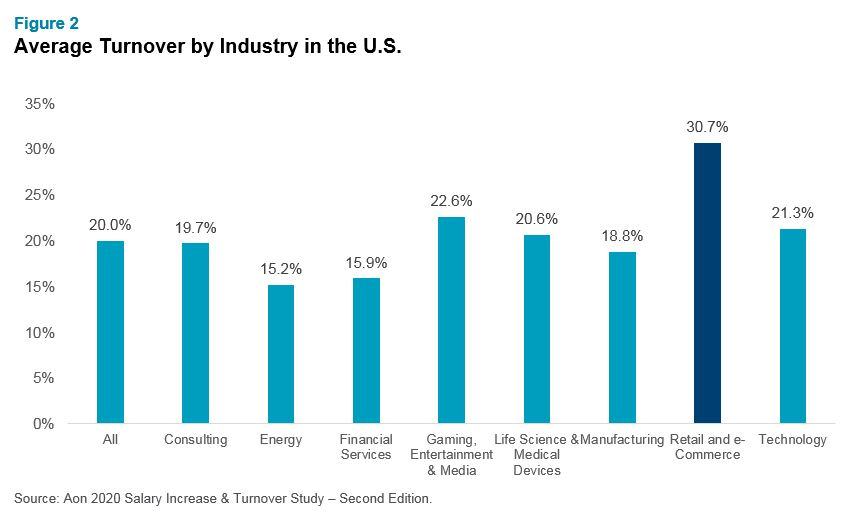A successful retail operation needs a great team. This is because, to a huge extent, retail is all about personality. Establishing a rapport with the customer, finding out their needs, and pointing out the solutions your business offers are elements that some people find easier than others.
Your team needs people who can bring these abilities to the table. You need people who can connect.
That being the case, you need a recruitment operation that can deliver people with the right talents. Yes, training can do much to improve staff quality, but there’s no substitute for attracting and employing the right people in the first place. Let’s take a look at how you can use retail recruitment to bolster your team and get your business moving up to the next level.
What is retail recruitment?

Retail recruitment is the process whereby large and small businesses recruit for their retail operation. This process covers assessment of staffing needs, advertising of the post(s), appraisal of applications, selection of candidates for interview, interview scheduling, the interview process itself, selection of best interviewee, and informing all applicants of the outcome of their applications.
If you’re thinking, this all sounds much like recruitment in any other field, where retail recruitment differentiates itself in the particular challenges it faces. This is what we’ll now turn to.
What are the challenges in retail recruitment?
All recruitment processes face challenges. From attracting enough applicants to avoiding bias, recruitment can be a tricky business. Retail recruitment, in particular, can include the following challenges.
Getting the right person

As we mentioned above, retail is driven by certain personality factors. So, you need to be sure that your retail recruitment brings people in with those personalities.
A retail employee needs good interpersonal communication skills, empathy, confidence, and warmth, and an ability to weather rejection and bounce back so that the next client gets the best out of your retail operation, regardless of prior events.
Overall, the main difficulty with retail recruitment is that you’re looking for people with skills that a lot of people think they have but actually don’t. Most people would like to think that they have a modicum of charm and an ability to connect, but more often than not, this comes down to a facility for dealing with people they like or perceive a similarity to.
Salespeople who excel possess the robust ability to get on with most, if not all, customers, finding a way to connect with the vast majority of people they encounter. Such proficiency in customer interactions is a rare skill. So your retail recruitment needs to be top quality in order to find it out there.
Finding tech skills
An increasing number of retailers sell or rely on technology. For this reason, it’s imperative that retail staff have an awareness of and familiarity with tech products. There’s nothing more off-putting than being served by a member of retail staff who obviously has no idea what they’re selling and who has to keep checking product info for the answers to customer queries.
For instance, if you have a business selling laptops or tablets, you will want staff who are enthusiastic about these devices and who keep on top of the latest developments.
Staff who love this area of life are eager to share the benefits of the latest models with every customer they meet. It’s the same with any tech field and whatever you’re trying to sell, from new apps to a virtual phone system.
For in-store sales, you’ll want to ensure your staff knows how to use your retail POS system. This includes everything from ringing up sales to accepting various customer payment types, taking returns, and clocking in and out to log their hours.
Managing remote businesses adds an additional layer of complexity to retail recruitment. It’s not just tech products that staff should be on top of. They should also be well aware of any multi-channel retail processes that your business offers to meet consumer demands, such as buying online and picking up in brick-and-mortar stores.
Additionally, staying informed about the findings and recommendations of the latest remote work report can help your retail recruitment strategies adapt to the evolving needs of remote employees.
Retaining staff
For a number of reasons, retail tends to see higher attrition than most other sectors.

Why is this? One of the reasons is pay levels—retail is often associated with pay at the lower end of the scale. Also, it has to be said that retail is not for everyone. We’ve touched on how rare good retail skills are. One we haven’t mentioned is forbearance. Most jobs can be repetitive, especially over extended periods of time. Retail can certainly be so, and not everyone can hack this.
That’s one side of things. Retail is also disproportionately staffed by people who are most likely to move on, regardless of how they perform and what they think of the work. Students, for instance, are often to be found working in retail, as the hours and locations of the stores can be highly convenient for those with particular hours of the day to offer and who often aren’t able to travel far.
Retail recruitment strategies that meet these challenges
The challenges in retail recruitment can be difficult, but try these strategies, and you should find that success ensues.
Keep on top of recruitment needs
In a fast-moving retail environment, recruitment requirements will change quickly. This includes the number of posts needing to be filled, as well as the exact nature of the candidates you’re looking for.
So, you need to keep abreast of developments that affect your staffing needs. Check your POS reports. Are you finding that a particular sales channel is on a downward trend? Then consider scaling down that part of the operation. If this can be done through natural wastage, then that’s terrific.

Quite often, introducing new technology will result in lower staffing costs or the potential for redeploying staff in more productive areas. For instance, say you’ve made the decision to invest in recruitment CRM. As well as being an excellent way of keeping on top of candidates’ journeys through the recruitment process, this kind of tech can free up admin staff to use their talents more creatively.
Audit the process
Again, stay on top of what’s happening, in this case, in your actual retail recruitment process. In a competitive environment such as retail recruitment, your process shouldn’t deter applications because of any over-length components or frustrating and/or unnecessary questions.
Take on the role of applicant and try the experience for yourself. See where the sticking points are, and work to make candidate experiences as niggle-free as possible.
Also, take the opportunity to seek out spelling and grammatical errors. Some potential candidates, given the choice between a business that displays competent literacy and one that seems to struggle, will opt for the former.
Back to basics
Don’t forget this essential premise: candidates need to know what they’re applying for. Be specific and precise with job titles.
Be explicit about what you need to see in a candidate. When you want someone with a particular experience, whether it’s using social media, an email builder, or a cash register, list it in the spec. This kind of transparency can help with employee retention. Ending up in a job you didn’t apply for can make an employee want to leave, understandably.
It’s only fair also to list payment levels. You may think that pay shouldn’t be a determining factor and that it should be more about an unquenchable desire to work in retail, regardless of the remuneration offered.
However, it’s not very respectful of your prospective employee’s time not to give in your job posting a piece of information that may be essential to their decision whether to apply or not.
Choose the right channels

There’s quite a range of channels to use nowadays, and it’s tempting to think you can just choose your personal favorite. Hold it right there. This is a vital point that you need to get right. Different channels tend to have different kinds of users, broadly speaking. To ensure workplace diversity and inclusion, consider using a mix of channels that cater to various demographics and backgrounds.
So, if you want an applicant pool full of young, funky types, you should send out your recruitment messages on TikTok, for instance. If you want to attract a more traditionally-minded set of applicants, you might be well-advised to use a service such as Indeed or another career website or even stick your ad in the local newspaper or on a community website.
Respond to the situation out there
The levels of talent available will fluctuate over time, depending on seasonal factors and any competing employers fishing in the same pool. You need to adjust your tactics accordingly to stand a chance of attracting the best-qualified candidates.
In times when talent is in rich supply, use techniques in your hiring process, such as an easy-apply option on your website, a referral program, and automated candidate pre-screening. Check your candidate management system to see if these are available to you.
In times when talent is thinner on the ground, you should up your game by making your business more of an enticing prospect by working on improving employer branding.
Try also more targeted recruitment strategies, and use cost-per-click technology to identify where recruitment ROI is highest. Consider doing high-profile hiring events to attract quality candidates.
Great retail recruitment sells success
Retail recruitment can be hard to get right. Challenges for retail companies exist in the shape of identifying and attracting the right kind of person with the right blend of skills. And once you’ve got them, it can be tricky to keep them.
However, by keeping your retail recruitment operation current (in terms of operational needs and labor availability), you can ensure that it is efficient and effective. By using the right comms channels, you can help to attract the right kind of applicant.
And by being clear and upfront about the job and what you’re offering, you stand a better chance of retaining your new employees. That’s how you achieve success in your retail recruitment efforts.










